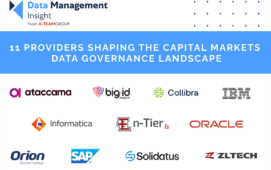Regulations – and not straight-through-processing, and the potential for operational efficiencies – are driving financial institutions to grasp control of their reference data management processes. Reference data initiatives are increasingly driven by senior management – often at board level – mostly through fear of regulatory censure should they fail to comply with the new regulations.
Meanwhile, around 90 percent of firms believe that reference data budgets – effectively frozen during the market downturn – will rise next year. And over 70 percent of reference data managers acknowledge the increasing importance of coordination between data management activities supporting mid- and back-office functions and those supporting front-office activities. Indeed, over 30 percent already have a centralized approach to management of data across the enterprise.
These are just a few of the early findings from a survey of around 100 reference data managers conducted by A-Team, (publishers of Reference Data Review) through September 2004. The main findings of the survey, commissioned by Reuters, will be presented at this year’s Sibos in a Reuters’ presentation by Kevin Bradshaw, managing director of DataScope on Tuesday 12. You can also find out how to obtain your free copy at the Reuters booth 204K at Sibos.
The wide-ranging survey was conducted in an attempt to understand institutions’ approaches and attitudes toward effective data management. It also set out to understand some of the business drivers that are changing reference data management techniques, and get a feel for how far institutions had progressed in the past two years.
While straight through processing has long been held as the primary driver behind a more strategic view of reference data management, many executives surveyed had not used it in presenting the business case to senior management. Rather, enforced regulatory requirements, particulary Basel II and Know Your Client, have kick-started institutions into action. Where originally data management was driven by accounting needs and handled by junior and mid-level managers, the potentially high-profile ramifications of regulatory non-compliance have hit senior management’s desks, resulting in an elevation in the importance of data management – which is finally seen as a crucial factor in ensuring compliance.
All institutions participating in the survey have taken a serious approach to reference data management. Several have had a reference data management strategy in place for five years. These have typically grown in scope over time, with more and more operational departments reaping the benefits. Others have instituted reorganizations over the past year or two in an effort to bring together various data silos of previous management efforts into a centralized structure as part of an enterprisewide strategic vision. Surprisingly, most firms interviewed had developed their own proprietary platform systems for managing data rather than using external technology providers.
Of those that recognized the importance of coordination between data management activities supporting middle- and back-office functions and those supporting front-office activities, a range benefits were cited. These included: increased accuracy and consistency throughout the enterprise (with the added advantage of helping STP initiatives); reduction in operational risk; and cost savings from rationalized data sources. Other benefits included: cost savings from reduced headcount; unifying of contracts; ensuring of contractual compliance; and a pooling of knowledge
As such, a majority of managers interviewed said this coordinated approach was increasingly part of their strategy or at least something to which they aspired.
This feature, of course, only touches on some of the high-level themes explored through over 60 questions in the survey. Other areas covered included: internal politics as a potential hurdle, budgets, perceptions of data quality, attitudes regarding the importance of ROI, the number of information sources by data type used at institutions, why duplication of data is essential, what users view as essential when dealing with external data vendors, whether the cost of data has changed over the past couple of years, outsourcing trends, and more.
Subscribe to our newsletter



